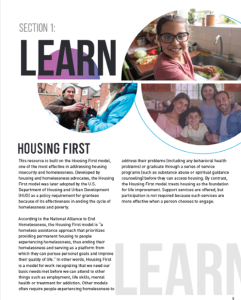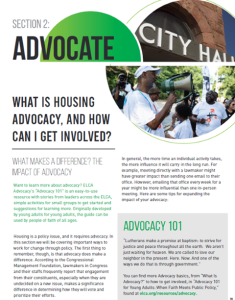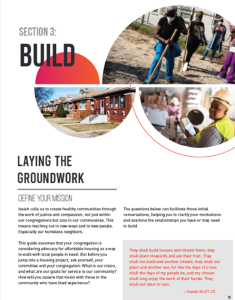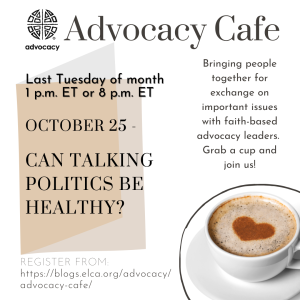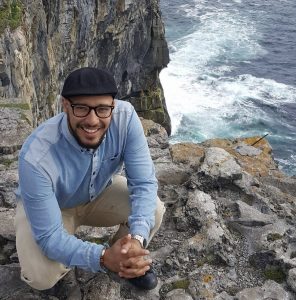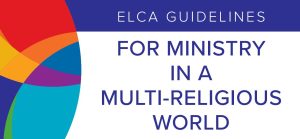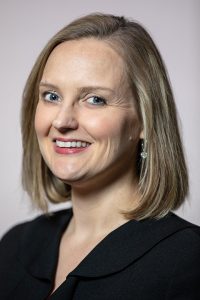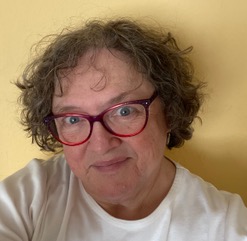Following are updates shared from submissions of the Lutheran Office for World Community and state public policy offices (sppos) in the ELCA Advocacy Network this month. Full list and map of sppos available.
U.N. | Colorado | Minnesota | Pennsylvania | Virginia | Washington
U.N.
Lutheran Office for World Community (LOWC), United Nations, New York, N.Y. – ELCA.org/lowc
Dennis Frado, Director
The UN High Level Political Forum (HLPF) is was held from Tuesday, 5 July, to Thursday, 7 July, and from Monday, 11 July, to Friday, 15 July 2022, under the auspices of the Economic and Social Council (ECOSOC). It included a three-day ministerial segment of the forum from Wednesday, 13 July, to Friday, 15 July 2022. The high-level segment of the Council concluded with a final day on Monday, 18 July 2022.
The theme for the 2022 HLPF was “Building back better from the coronavirus disease (COVID-19) while advancing the full implementation of the 2030 Agenda for Sustainable Development”.
The HLPF reviewed in-depth Sustainable Development Goals: 4 on quality education, 5 on gender equality, 14 on life below water, 15 on life on land, and 17 on partnerships for the Goals. In addition, 44 countries will carry out voluntary national reviews (VNRs) of their implementation of the 2030 Agenda for Sustainable Development. The HLPF is scheduled to adopt a Ministerial Declaration as the outcome of its session.
Colorado
Lutheran Advocacy Ministry Colorado (LAM-CO) – lam-co.org
Peter Severson, Director
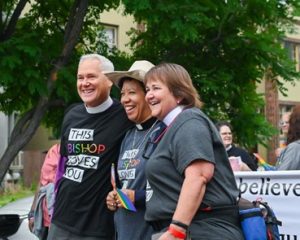
ELCA Rocky Mountain Synod Bishop Jim Gonia (left) joins Episcopal Church in Colorado Bishop Kimberly Lucas (center) and Mountain Sky Area of The United Methodist Church Bishop Karen Oliveto (right) to walk together in the Denver Pride Parade on June 26, 2022.
Image credit: Saint John’s Cathedral, Denver
This summer, Lutheran Advocacy is working as a member of the Healthy School Meals for All Coalition to advance a ballot measure. The measure – which was referred directly onto the ballot by the Colorado Legislature via House Bill 22-1414 – will ask voters to approve covering the cost of school meals for all public school students. During the height of the COVID-19 pandemic, the federal government initiated a nationwide program to cover public school students’ meal costs. That temporary program is ending, and Coloradans now have the opportunity to do so at a state level in perpetuity. The program will be paid for by capping state income tax deductions for wealthy Coloradans who earn over $300,000 in annual income. The revenue generated by the tax code change is dedicated solely to the program, which will keep Colorado kids fed and ready to learn.
Minnesota
Tammy Walhof, Director
Lutheran Advocacy-Minnesota held its quarterly policy council meeting on June 3rd. We discussed the end of the legislative session and held two important elections. Sharon Josephson from the Northwestern Minnesota Synod was re-elected as Vice-President and the Rev. Kyle Hanson from the Minneapolis Area Synod was elected as Treasurer. We are grateful for the ways that Josephson and Pastor Hanson are sharing their time and talents to support the work of LA-MN, and we look forward to their two-year terms.
Hopes for a special session in the Minn. legislature have dissipated in recent weeks. This is due to partisanship, with all eyes on the November elections. Communities across Minnesota are suffering as a result of inaction this legislative session, which ended on May 23. We lament lack of action on systemic issues that harm our neighbors, ourselves, and all of creation, and we continue to anticipate how we can use our public voice to generate systemic change.)
Rachel Wyffels, Hunger Advocacy Fellow with LA-MN, recently had the opportunity to attend Community Organizing Training with the Minneapolis Area Synod. Members of Street Voices of Change and other congregational leaders from the synod gathered for a week centered on understanding and building power. Wyffels looks forward to applying this training on strategy, coalitions, and more to her future work.
Tammy Walhof is on sabbatical from June 13th to August 12th! Rachel Wyffels, Hunger Advocacy Fellow, is the primary contact person for LA-MN during this time.
Pennsylvania
Lutheran Advocacy Ministry – Pennsylvania (LAMPa) lutheranadvocacypa.org
Tracey DePasquale, Director
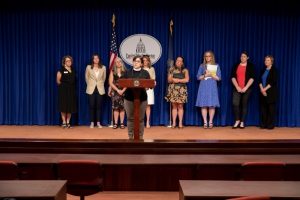
The Rev. Angela Hammer of St. Paul’s, Penryn, in Lower Susquehanna Synod, speaks at a Capitol Press Conference about hunger among seniors and persons with disabilities.
The 2022-23 Pennsylvania budget includes significant gains for education, housing and creation care, but only a modest increase for anti-hunger programs. A $1.8 billion increase in education funding makes strides toward decreasing the funding gap in what has been one of the least equitable school funding systems in the country.
“We are celebrating the progress made in closing these equity gaps, as well as the major investments in housing and creation care,” said LAMPa Director Tracey DePasquale. “While we are grateful for the modest increase in anti-hunger programs, we have concern that it will not go far enough in the face of rising food prices.
“Advocates engaged in ministry with neighbors facing hunger and homelessness shared stories with lawmakers of increasing need on both fronts,” DePasquale said.
Among LAMPa’s priorities, the spending plan allocates $375 million in American Rescue Plan (ARP) funding for affordable housing construction, rehabilitation, and repairs.
“The Whole Home Repairs Program is exciting because it will help Pennsylvanians, especially seniors and persons with disabilities, stay in their homes,” DePasquale said. “It will extend the life of our aging housing stock, help build generational wealth, and increase energy efficiency. It’s a win for our communities and our environment.” Read more about LAMPa’s budget advocacy here.
Along with the budget, the legislature approved five constitutional amendments, including one that would deny any right to an abortion. Though the amendment would not ban abortions outright, it could pave the way for such a ban, which LAMPa would oppose. Read more about the amendments here.
Virginia
Virginia Interfaith Center for Public Policy (VICPP)
Kim Bobo, Executive Director
The Virginia Interfaith Center for Public Policy (VICPP) finally finished the 2022 General Assembly when the governor signed the budget bill in June. The budget included an additional $40 million for affordable housing that VICPP had advocated and a partially refundable state Earned Income Tax Credit (EITC) that will put more money into the hands of working Virginians.
This summer, VICPP is moving forward two of its priorities that had turned into study bills in order to be prepared for the next General Assembly. One is a bill to require health professionals to get trained in unconscious bias. The other is a bill to reduce the use of solitary confinement in Virginia’s prisons.
In addition to the policy work, this summer VICPP is organizing several activities to promote justice. On July 23, VICPP led a religious fact-finding delegation to learn about conditions in the Lawrenceville Correctional Facility, the state’s only for-profit prison. On July 30th, VICPP will host a Living Wage Certification Canvass Day to reach out to businesses about living wages (in Richmond, Harrisonburg, Alexandria and Charlottesville). On August 11, VICPP is organizing a religious delegation to meet with Dulles airport workers about the need for paid sick days and employer provided health care. Lutherans are invited to join any of these social justice events. Email Kim Bobo, Kim@virginiainterfaithcenter.org to get more information on any of the upcoming events.
Washington
Faith Action Network (FAN) – fanwa.org
Elise DeGooyer, Director
Advocacy this summer has already included bills in Congress that will impact communities across our state, with an urgent need to prevent gun violence in the wake of too many mass shootings. We prayed and marched with local faith groups and Alliance for Gun Responsibility partners, remembering the victims and calling for action. We applaud the recent bipartisan gun legislation passed in Congress, while we know there will be more protections needed. We have also signed on to letters regarding federal housing legislation, immigration reform, the Child Tax Credit, and truth and reconciliation for survivors of Native American Boarding Schools.
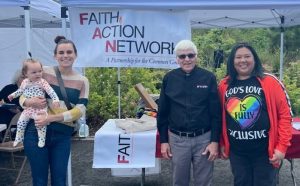
Pictured are FAN Eastern Wash.A organizer Lauren Schubring and baby Stella, board member Rev. Jim CastroLang, and Policy Engagement Director Kristin Ang.
Our FAN Governing Board and staff issued a statement in response to the Supreme Court Dobbs decision that will restrict access to abortion and reproductive healthcare across our nation. Also, a faith leader in our network, the Rev. Doug Avilesbernal of the Evergreen Association of American Baptist Churches, came to Washington, D.C. on the day of Bremerton v Kennedy arguments to speak out in front of the Supreme Court to uphold the separation of church and state in the case involving a Bremerton, Wash. football coach. We have much work to do to support the religious freedoms that we value as a multi-faith movement.
During the month of June, we were able to celebrate as well. FAN had a presence at the Spokane Pride march and festival, and many of our faith communities were visible in their local Pride events. Faith communities and community groups collaborated to celebrate Juneteenth in a big way for the first time as a federal holiday. We give thanks for the ability to celebrate love, inclusion, and freedom in the midst of the hard work we all do together!


